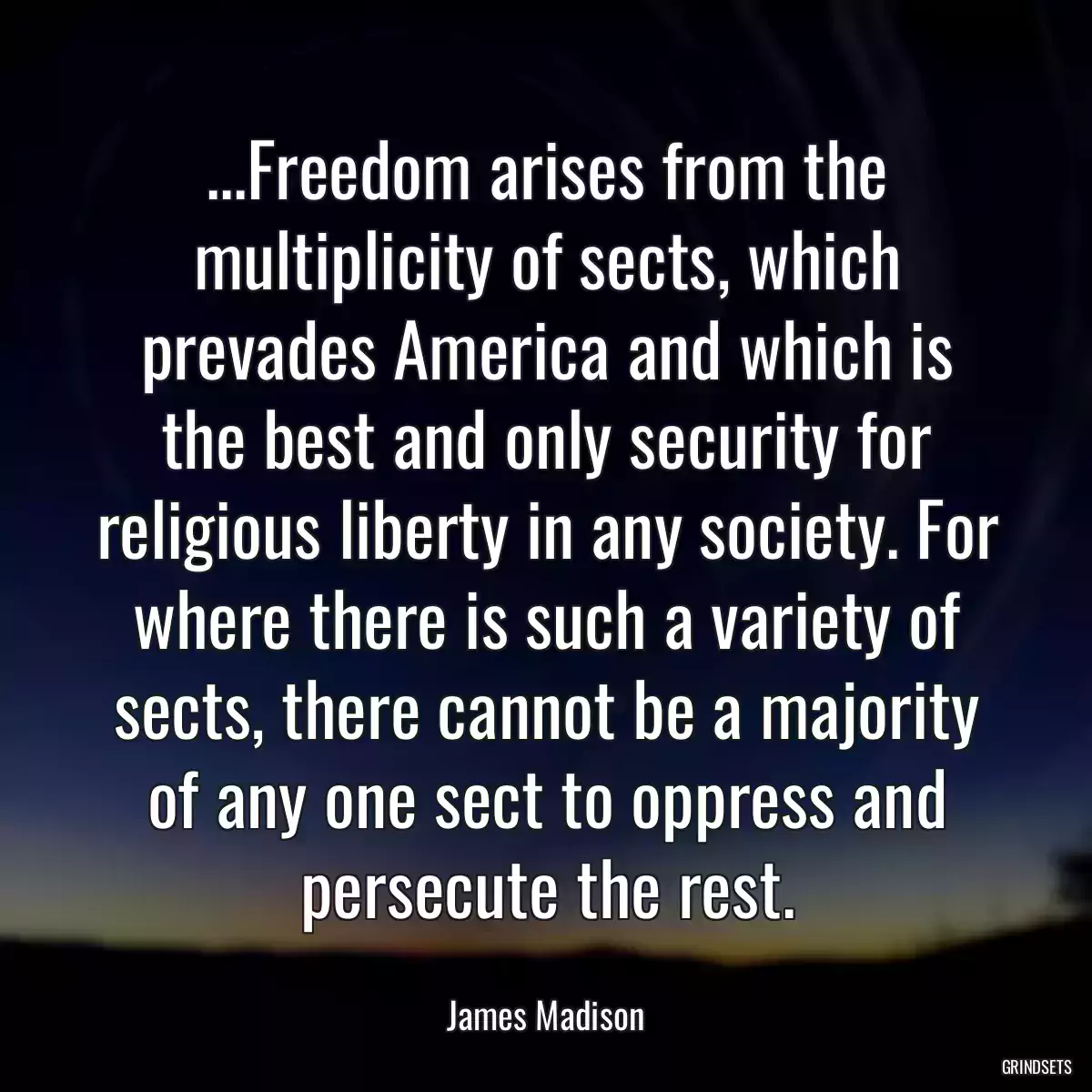![No power over the freedom of religion [is] delegated to the United States by the Constitution.](/fotos/70/703b8f7b80a62c2eb7b028306600ed56.webp)
Quotes James Madison - page 6
Find dozens of James Madison with images to copy and share.
![No power over the freedom of religion [is] delegated to the United States by the Constitution.](/fotos/70/703b8f7b80a62c2eb7b028306600ed56.webp)
Because we hold it for 'a fundamental and undeniable truth', that religion or 'the duty which we owe to our Creator' and the manner of discharging it, can be directed only by reason and conviction, not by force or violence.
I flatter myself [we] have in this country extinguished forever the ambitious hope of making laws for the human mind.
The people shall not be restrained from peacefully assembling and consulting for their common good, nor from applying to the legislature by petitions, or remonstrances for redress of their grievances.
You may also like
The people shall not be deprived or abridged of their right to speak, or to publish their sentiments; and the freedom of the press, as one of the great bulwarks of liberty, shall be inviolable.
Frequent elections are unquestionably the only policy by which this dependence and sympathy can be effectually secured. But what particular degree of frequency may be absolutely necessary for the purpose, does not appear to be susceptible of any precise calculation; and must depend on a variety of circumstances with which it may be connected. Let us consult experience, the guide that ought always to be followed, whenever it can be found.
Congress shall make no law respecting an establishment of religion, or prohibiting the free exercise thereof.
Before any man can be considered as a member of Civil Society, he must be considered as a subject of the Governour of the Universe: And if a member of Civil Society, do it with a saving of his allegiance to the Universal Sovereign. We maintain therefore that in matters of Religion, no man's right is abridged by the institution of Civil Society and that Religion is wholly exempt from its cognizance.
The experience of the United States is a happy disproof of the error so long rooted in the unenlightened minds of well meaning Christians, as well as in the corrupt hearts of persecuting Usurpers, that without a legal incorporation of religious and civil polity, neither could be supported. A mutual independence is found most friendly to practical Religion, to social harmony, and to political prosperity.

Happily for the states, they enjoy the utmost freedom of religion. This freedom arises from that multiplicity of sects which pervades America, and which is the best and only security for religious liberty in any society.
When indeed Religion is kindled into enthusiasm, its force like that of other passions is increased by the sympathy of a multitude. But enthusiasm is only a temporary state of Religion, and whilst it lasts will hardly be seen with pleasure at the helm. Even in its coolest state, it has been much oftener a motive to oppression than a restraint from it.
[Regarding legislative assemblies,] the number ought at most to be kept within a certain limit, in order to avoid the confusion and intemperance of a multitude. In all very numerous assemblies, of whatever characters composed, passion never fails to wrest the scepter from reason. Had every Athenian citizen been a Socrates, every Athenian assembly would still have been a mob.
Inference is founded upon obvious reasons. Regard to reputation has a less active influence, when the infamy of a bad action is to be divided upon a number, than when it is to fall singly upon one. A spirit of faction . . . will often hurry the persons of whom they were composed into improprieties and excesses for which they would blush in a private capacity.
In republican government the legislative authority necessarily predominates. The remedy for this . . . is to divide the legislature into different branches; and to render them by different modes of election, and different principles of action, as little connected with each other as the nature of their common functions, and their common dependence on the society, will admit.